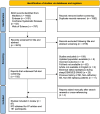Outcome of emergency neurosurgery in patients with refractory and super-refractory status epilepticus: a systematic review and individual participant data meta-analysis
- PMID: 38863514
- PMCID: PMC11165020
- DOI: 10.3389/fneur.2024.1403266
Outcome of emergency neurosurgery in patients with refractory and super-refractory status epilepticus: a systematic review and individual participant data meta-analysis
Abstract
Background: Refractory (RSE) and super-refractory status epilepticus (SRSE) are serious neurological conditions requiring aggressive management. Beyond anesthetic agents, there is a lack of evidence guiding management in these patients. This systematic review and individual participant data meta-analysis (IPDMA) seeks to evaluate and compare the currently available surgical techniques for the acute treatment of RSE and SRSE.
Methods: A systematic review was performed according to the Preferred Reporting Items for Systematic Reviews and Meta-Analyses for Individual Participant Data (PRISMA-IPD). Only patients who underwent surgery while in RSE and SRSE were included. Descriptive statistics were used to compare various subgroups. Multivariable logistic regression models were constructed to identify predictors of status epilepticus (SE) cessation, long-term overall seizure freedom, and favorable functional outcome (i.e., modified Rankin score of 0-2) at last follow-up.
Results: A total of 87 studies including 161 participants were included. Resective surgery tended to achieve better SE cessation rate (93.9%) compared to non-resective techniques (83.9%), but this did not reach significance (p = 0.071). Resective techniques were also more likely to achieve seizure freedom (69.1% vs. 34.4%, p = <0.0001). Older age at SE (OR = 1.384[1.046-1.832], p = 0.023) was associated with increased likelihood of SE cessation, while longer duration of SE (OR = 0.603[0.362-1.003], p = 0.051) and new-onset seizures (OR = 0.244[0.069-0.860], p = 0.028) were associated with lower likelihood of SE cessation, but this did not reach significance for SE duration. Only shorter duration of SE prior to surgery (OR = 1.675[1.168-2.404], p = 0.0060) and immediate termination of SE (OR = 3.736 [1.323-10.548], p = 0.014) were independently associated with long-term seizure status. Rates of favorable functional outcomes (mRS of 0-2) were comparable between resective (44.4%) and non-resective (44.1%) techniques, and no independent predictors of outcome were identified.
Conclusion: Our findings suggest that emergency neurosurgery may be a safe and effective alternative in patients with RSE/SRSE and may be considered earlier during the disease course. However, the current literature is limited exclusively to small case series and case reports with high risk of publication bias. Larger clinical trials assessing long-term seizure and functional outcomes are warranted to establish robust management guidelines.
Keywords: epilepsy surgery; neuromodulation; refractory status epilepctius (RSE); status epilepticus; super refractory status epilepticus (SRSE).
Copyright © 2024 Niazi, Han, Stamm, Shlobin, Korman, Hoang, Kielian, Du Pont-Thibodeau, Ducharme Crevier, Major, Nguyen, Bouthillier, Ibrahim, Fallah, Hadjinicolaou and Weil.
Conflict of interest statement
AF serves on the board for Pediatric Epilepsy Surgery Alliance. GI serves on the advisory board of Synergia Medical. AW is a consultant for Monteris and serves on the advisory board of Synergia Medical. The remaining authors declare that the research was conducted in the absence of any commercial or financial relationships that could be construed as a potential conflict of interest. The handling editor SS declared a shared affiliation with the author NS at the time of review.
Figures






References
-
- Glauser T, Shinnar S, Gloss D, Alldredge B, Arya R, Bainbridge J, et al. Evidence-based guideline: treatment of convulsive status epilepticus in children and adults: report of the guideline Committee of the American Epilepsy Society. Epilepsy Curr. (2016) 16:48–61. doi: 10.5698/1535-7597-16.1.48, PMID: - DOI - PMC - PubMed
Publication types
LinkOut - more resources
Full Text Sources

